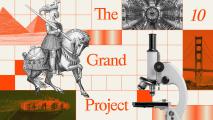The Venerable Yifa — a Taiwanese Buddhist nun, scholar, and writer — and her educational nonprofit, the Woodenfish Foundation, recently invited me to Taiwan to talk with Buddhist nuns and monks about how gene editing may affect the future practice of Buddhism.
This trip was the first time I’d really delved deeply into Buddhist philosophy, and I came to understand something astounding: Buddhists aren’t trying to live as long as possible or make it to an afterlife like many people in Western culture. They are essentially trying to end a cycle of reincarnation and suffering — and cease to exist.
Immortality isn’t progress. It’s paralysis.
I’m not a believer in the modern longevity movement. While there are serious scientists studying how to extend healthspan or delay aging, much of it seems more like a religion than a scientific initiative. The figureheads tout data-based legitimacy while shilling questionable supplements on the side. Still, it came as a shock to me that not all cultures view death as, at the very least, something to avoid. I’ve long been skeptical of the longevity movement, but I now see the West’s general mission in life — to live as long as possible with the best health possible — as a narrow-minded view of what it means to live well.
The other day, I texted the Venerable Shi Daofu, my Buddhist nun bestie whom I met in Taiwan, and asked if she feared death. She responded, “I am not very afraid of death. Because birth, old age, illness, and death are the inevitable processes of life.” So simple, and yet many people have so much trouble comprehending this point of view. Billionaires fund longevity startups. Biohackers chase cellular youth. Headlines speak of reversing aging, defeating death, living forever.
But immortality is a dangerous fantasy. It sounds like salvation, but it’s just another form of control. A refusal to let go. A denial of the very conditions that make life work. Dead dinosaurs became the oil that powers our machines. Without dead microbes and plants to enrich our soil, we wouldn’t be able to grow crops. Our immune systems rely on programmed cellular death to protect us. The elements we’re made of — carbon, iron, gold — only exist because ancient stars exploded and died.
Death is not a flaw in the system — it is the system.
Immortality isn’t progress. It’s paralysis. Without death, things would never evolve, never adapt, never give rise to the beauty we experience. There is a saying: “Science advances one funeral at a time” — but it’s not just science. It’s art, philosophy, and life itself. The complex interactions that built our planet and filled our world with oxygen, CO2, flowers, and fruit should not be so easily discarded.
We are here because of death. It’s not a flaw in the system — it is the system. And yet, in the rush to extend life indefinitely, that truth is often ignored. If we can’t think more deeply about death, we may create more problems than solutions for future generations by disrupting the natural cycle of life.
Even in the most mechanical view of the universe, death still feels like it means something. It moves atheists to tears, evokes reverence from physicists, and inspires awe in biologists. What if death isn’t a defect to be fixed, but the foundation on which everything else rests? Maybe the question isn’t “What’s the meaning of life?” but “Why does life end?” And maybe the answer is because the ending is also the beginning.
We’d love to hear from you! If you have a comment about this article or if you have a tip for a future Freethink story, please email us at [email protected].





















